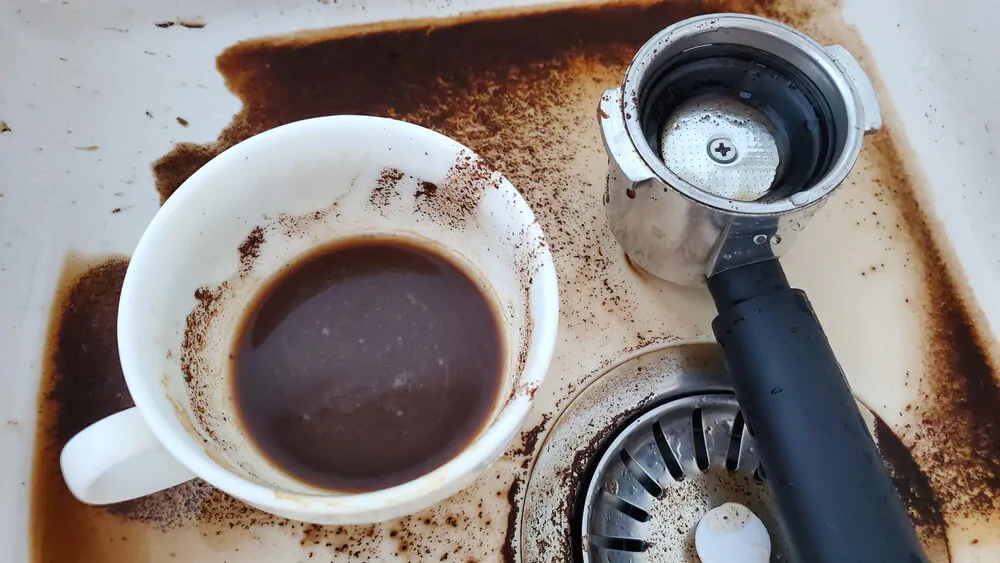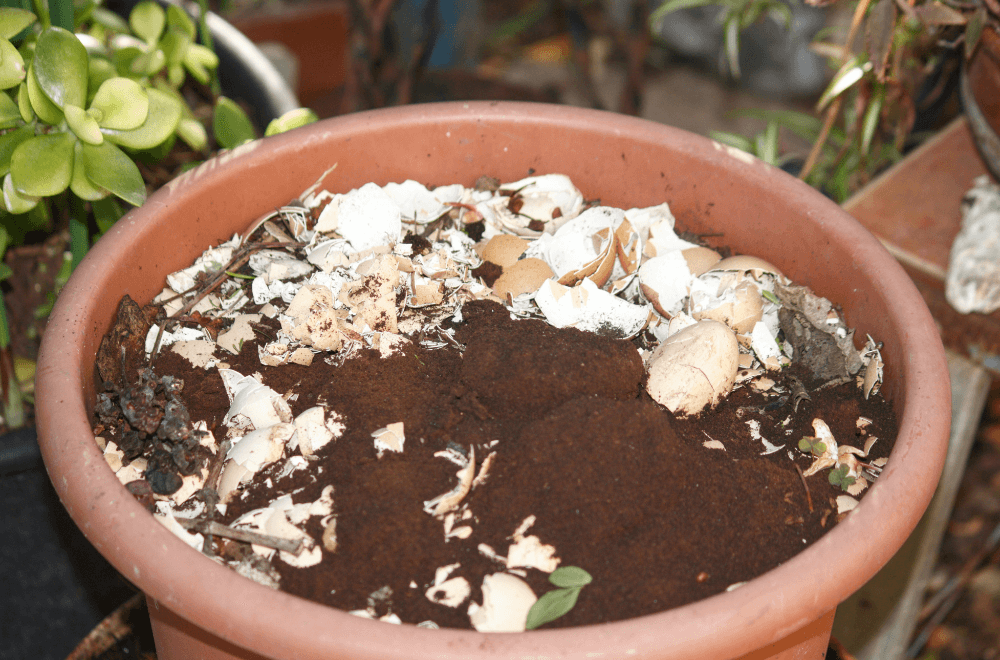Are you wondering how to dispose of coffee grounds? Can you put discarded coffee grounds down the sink? We’ll explain how to dispose of coffee grounds properly.

Over the past few years, more and more people have been making their own coffee at home. As someone who has done this extensively, I’ve seen that this has both pros and cons. While there’s the cost advantage of having a well-roasted cup of coffee at home in the morning, there may be a few drawbacks as well.
You might be stumped on how to dispose of coffee grounds and wonder, should you put your coffee grounds in the garbage disposal? It’s best not to put your coffee grounds in the garbage disposal. Instead, you can put them in your general waste bin, compost them, or find new purposes for coffee grounds, such as using them to eliminate odors or in skin scrubs.
Five Ways To Dispose Of Coffee Grounds
While you can dump coffee grounds in the trash can, you can also repurpose them.
1. In The Garden
Coffee is a useful addition to your home and garden and can be used to prevent ants from entering your home and enhance garden soil. Be aware when applying these techniques that coffee grounds are highly toxic to dogs and cats.
Here are some ways coffee grounds can benefit your garden:
Repel Pests
Common pests will abandon your house and garden when you use coffee grounds. The acids in coffee grounds can repel ants, snails, and slugs.
Spread a line of coffee grounds one to two inches thick around your home every two weeks. To target ants directly, apply used coffee grounds to the boundaries of a mound and sprinkle more on top of the hill.
Composting

Composting creates a natural fertilizer of decomposing organic matter that you can add to garden soil to nourish your plants. Used coffee grounds are rich in nitrogen, which attracts worms to your compost bin and garden. Coffee is also rich in calcium, magnesium, potassium, and other vitamins and minerals.
2. Maintain Furniture
Coffee grounds are useful for keeping your furniture looking good. To hide unsightly scratches or dings on furniture, make a staining paste from coffee grounds. Pour a few drops of water onto the grounds, then dip a cotton swab into the moist grounds.
Dab the swab on the scratched area, then wait five to ten minutes for the wood to absorb the coffee. Buff the wood with a soft rag. Repeat the process to get a deeper shade.
3. Eliminating Odors
Coffee grounds are good not only for hiding scratches but also for keeping odors away. Coffee grounds soak up odors while giving off an aromatic scent.
Put dried used coffee grounds in a shallow jar, then place the jar in your fridge or any area where you want to remove bad smells.
4. Creating Non-Slip Surfaces
Use coffee grounds to winterize your home if you live in an area where winter brings ice and snow. The nitrogen in coffee grounds acts as a deicer.
While salt is the usual remedy for slippery sidewalks, coffee grounds are not toxic to flora and fauna. Salt can kill plants and living organisms in soil. Sprinkle coffee grounds on sidewalks and steps to help to prevent falls.
5. Use Coffee In Self-Care
Coffee grounds’ gritty texture is useful for your beauty regime. Using a few simple ingredients, you can make your own hair and skin formulas.
Hair
Conditioners can leave a residue that dulls your hair. Coffee grounds mixed with your favorite shampoo can return shine to your hair by stripping conditioner residue from your tresses.
High-quality, freshly ground coffee beans work better than grounds from instant or packaged coffee.
Skin
Coffee grounds can add nutrients to your skin. The primary nutrient found in coffee grounds is caffeic acid, an antioxidant that may boost collagen levels. Coffee grounds are also antimicrobial and may protect your skin from germs such as those that cause acne.
Use coffee grounds for exfoliation. Mix coffee grounds with brown sugar and lemon juice to make a scrub. Rinse your skin with cool water and pat it dry after exfoliation.
Coffee grounds can also be mixed with a carrier such as natural yogurt and applied to the skin to reduce puffy eyes.
Lastly, you can make a foot bath with coffee grounds to remove dead skin. Once you have soaked your feet for a while, use the grounds in the water to gently scrub away any dead skin. While you might see claims that using coffee grounds in your skincare can protect against UV rays, you should wear a broad-spectrum SPF when out in the sun.
What Happens If You Dispose Of Coffee Grounds In The Garbage Disposal?
Disposing of used coffee grounds in the garbage disposal can clog the sink drain and pipes. The fatty acids in the coffee grounds cause grease buildup, clogged drain lines, or a total drain pipe blockage.
If you have mistakenly put coffee grounds down the garbage disposal, you can easily fix the buildup. Try one of these DIY ways to unclog your garbage disposal before you call a plumber:
Use A Plunger On A Clogged Drain
Put the plunger over the garbage disposer’s drain, allowing water to flow into the drain. Fill the garbage disposer with water until the water covers the plunger cup. Put a rubber stop on the other side of the drain and pump the plunger up and down ten or 15 times to clear the clog.
Clean The P-Trap

The P-Trap is the half-circle part of your kitchen sink’s plumbing that drains wastewater. Place a bucket under the sink, then unscrew the P-Trap and pull it away from the bucket. Clear the P-Trap manually and rinse the inside with cold water.
Reconnect the P-Trap.
Baking Soda Solution
Do you want to avoid harsh chemicals and use natural products for unclogging your sink? Raid your pantry for baking soda and vinegar. Since baking soda is alkaline, it is the best solution to organically clear coffee grounds from clogs.
If you combine baking soda, vinegar, and four quarts of boiling water, you can clear your tough clog in around an hour. Simply pour a cup full of baking soda down the sink, followed by the vinegar, which activates the baking soda, and immediately follow with the boiling water.
FAQs About Disposing Of Coffee Grounds
Why Are Coffee Grounds Hard To Dissolve?
Instant coffee dissolves in water, but beans and grounds do not go anywhere as they’re not processed the same. Those same beans also release oils during brewing. Oil and water don’t mix, so breaking down coffee oils is no small task.
How Do I Keep The Garbage Disposal Clear?
Don’t pour commercial drain cleaning agents down your garbage disposal, especially if you have plastic pipes, as they can erode plastic plumbing and cause leaks. Use degreasing liquid soap should food particles build up in the system.
What Else Shouldn’t I Put Down The Garbage Disposal?
Non-food items like glass, metal, and plastic should never go in a garbage disposal. Cigarette butts and any other combustible materials shouldn’t be put into the garbage disposal. It’s also best to avoid grease, fats, oils, and large animal bones.
